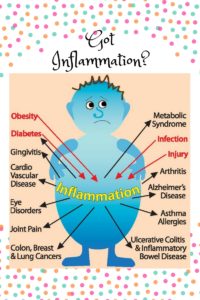Allergies and chronic inflammation go hand in hand. Allergies are another common sign of chronic inflammation. If you suffer from seasonal or year-round allergies, you have probably wondered why they seem to affect you but not some of your friends or members of your family. It’s because people wit allergies have an immune system that is launching an immune response  to harmless substances (like pollen), as if they are a threat to the body. This activates an immune response and causes that annoying persistent sneezing, mucus, and inflammation. The immune systems of your fortunate allergy-free friends is simply not perceiving those substances as harmful.
to harmless substances (like pollen), as if they are a threat to the body. This activates an immune response and causes that annoying persistent sneezing, mucus, and inflammation. The immune systems of your fortunate allergy-free friends is simply not perceiving those substances as harmful.
The body will provide a tone of subtle signs when someone starts to develop chronic inflammation, and this is where conventional medicine can sometimes fall short. Your doctor will be well aware of inflammation caused by infection or injury and fully recognize autoimmunity and autoimmune disease, but they don’t seem to pay much mind to the subtle signs of chronic inflammation. And if they do, they will prescribe a medication that will treat the symptoms and not the root cause.
This can be very disappointing as many studies have demonstrated the connection between inflammation and common ailments like obesity and heart disease, but we still don’t pay inflammation much mind until it’s contributing to a more obvious (and usually serious) problem. Doesn’t seem very logical. Wouldn’t it be better to treat the signs of chronic underlying inflammation before it turns into something more complicated?
Inflammation and Autoimmune Disease
Inflammation and autoimmune disease go hand in hand; the number one sign of autoimmune disease is some sort of inflammation. Autoimmune diseases are rampant in developed countries like the United States and can affect any area of the body. You can probably name a few off the top of your head. Here is a list of some common autoimmune diseases:
- Alopecia areata is a disease that causes hair loss on the scalp and face.
- Autoimmune hepatitis causes the body to attack the liver, causing major inflammation and damage.
- Dermatomyositis is a rare condition characterized by rashes and muscle weakness.
- Type 1 diabetes is an autoimmune condition in which the pancreas does not product any insulin.
- Graves disease is a disease that causes the overproduction of thyroid hormone.
- Guillain-Barre’ syndrome is an uncommon disorder in which your immune system attacks your nerves.
- Multiple sclerosis is characterized by the immune system’s attack on the central nervous system.
- Pernicious anemia occurs when the body can’t absorb vitamin B12 and therefore, can’t make enough red blood cells.
- Psoriasis is an inflammatory skin disease that causes cells to build up on the skin’s surface.
- Rheumatoid arthritis is diagnosed when the body’s immune system attacks the joints.
- Systemic lupus erythematosus is an inflammatory condition that manifests itself in a variety of symptoms in the skin, joints and other organs.
How do you get chronic inflammation?
Possibly, like many people, you suffer from an autoimmune or inflammatory condition. Or maybe you are experiencing frequent headaches, joint pain or one of the many signs of chronic underlying inflammation. Either way, if you ready attack it head-on, the best place to start is your diet. There are certain foods that cause inflammation and certain foods that fight inflammation. Some of the common foods that contribute to inflammation are:
- Sugar: sugar can activate inflammatory chemical signals that induce inflammatory pathways in the body.
- Saturated fats: several studies have shown that saturated fats create fat tissue inflammation that can contribute to heart disease and exacerbate overall inflammation.
- Trans fats: research has shown that consumption of trans fats can cause systemic inflammation.
- Refined carbohydrates: consuming refined carbohydrates like cake, pasta and cookies can contribute to inflammatory disease.
- Gluten: people with gluten sensitivity or celiac disease interpret gluten proteins as a threat to the body. This launches an immune response that attacks the intestines, causes the malabsorption of nutrients, and can lead to autoimmune disorders if left untreated.
- Dairy and casein: consuming dairy if you are sensitive or allergic to lactose can contribute to inflammation in your body. Casein is also on the list of inflammatory foods, the casein proteins found in dairy have a similar structure to gluten, and integrative and functional medicine doctors suspect it might be causing problems for many people.
- Artificial ingredients: aspartame and MSG
- Alcohol: alcohol is known to contribute to many diseases and disorders, some of which are inflammation related.
Advanced glycation end (AGEs) products and inflammation
Another less obvious concern is the presence of advanced glycation end products (AGEs). AGEs are compounds that are present in most animal products that increase in number and strength through grilling, frying and especially BBing. AEGs are known to contribute to inflammation and oxidative stress and are tied to diseases like diabetes.
To reduce your exposure to inflammation-causing AGEs, try cooking food slowly and at low heat. This can be a great excuse to expand your culinary range and experiment with stewing, poaching and braising.
Stress and inflammation
Most of us know that stress is bad for our health, but stress can be particularly harmful when it comes to inflammation. One study found that exposure to chronic stress actually changes the activity of the genes of immune cells — making them more likely to attack the body’s own tissue and trigger an autoimmune response. Like in many other chronic illnesses, stress seems to play a large role when it comes to inflammation and autoimmune disease.
If you think certain foods might be causing your inflammation and are totally overwhelmed by this — we get it! Take a look at our Integrative Gut Health page, connect with us and we can help.
So, exercise, meditate, get plenty of sleep and get help implementing a program that can start reducing the inflammatory responses in your system today. The sooner you do the sooner you will be feeling better and be on your way to optimal health.
We look forward to connecting with you soon.
Next in the series – Ways to treat inflammation!




